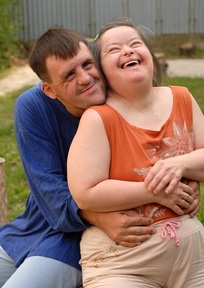There 'will always be a need' for care homes despite current trend towards supported living
A leading support provider for people with learning disabilities has suggested “there will probably always be a need for bespoke residential environments”, despite the current trend towards supported living.

Supported living was developed in the 1990s to enable people with learning disabilities to have more choice and independence in their lives. The main principles of supported living are that people with learning disabilities own or rent their home and have control over the support they get, who they live with (if anyone) and how they live their lives.
Support can range from a few hours a week to round the clock support. Local authorities as well as being keen to promote independence for people with learning disabilities, favour it for financial reasons as funding for the accommodation element of supported living comes out of the housing budget rather than social care.
James Allen, managing director of Consensus, which runs 68 residential care homes and 13 supported living schemes across the UK, says: “Supported living has become the preferred model for many commissioners. There is definitely a drive from local authorities for supported living with some saying they won’t be commissioning any more residential care for people with disabilities. However we believe there will always be a need for bespoke residential services for individuals with complex needs to live full and active lives”.
“We support over 500 individuals with a learning disability in a variety of settings across the UK. We have a clear expectation of how we will achieve the highest standards and a set of values that define the way we work and inspire success.”
Specialist support
Consensus provides specialist support to people with learning disabilities including those with autism, early onset dementia and the rare genetic disease Prader Willi Syndrome, which is characterised by an unregulated appetite, restricted growth, reduced muscle tone, learning difficulties and behavioural problems.
It operates the Gretton Homes Group which is renowned for its success in supporting people with Prader-Willi Syndrome (PWS). As a result of overeating, people with PWS often suffer from obesity-related conditions such as diabetes and heart disease.
To counter this, Consensus through its PWS services, delivers a very successful and structured support service in residential settings.
Supporting people with Prader-Willi Syndrome
One of its success stories is Chris, who arrived at Gretton Homes weighing 24st 4lbs and suffering from impaired mobility and breathing difficulties. He was reliant on oxygen at night to assist with his breathing, which was laboured and disturbing his sleep. Chris also suffered with Cellulitis, a condition that is common in adults with PWS who are also obese.

The first step taken by the team supporting Chris was to provide 24 hour food security, giving him total piece of mind that he no longer had to worry whether, what, how much and at what time he would eat. This was very different to his family home environment and took some time for him to adapt. Chris was also supported and encouraged to get into a routine of taking regular exercise. This initially took the form of gentle exercise which soon began to have the desired effect, to the point where he was able to take part in a range of more vigorous and regular aerobic exercise.
With the daily support of the team at Gretton Homes, as well as huge effort and determination from Chris himself, he has lost 14st 2lb and now weighs just 10st 2lb. This spectacular weight loss has enabled him to pursue a range of social, leisure and educational activities.
Chris says his greatest achievement to date is gaining paid employment with Travis Perkins, where he now works two days per week. It has enabled him to make new friends away from the Gretton Homes community and given his life a new, non PWS related, exciting and fulfilling dimension.
He says: “I like living at Gretton Homes, the staff support me with all my needs when I need them. My weight and health were a real problem before I arrived; my mum was really concerned about my health and mobility. I have now lost lots of weight and the staff have supported me to have control and manage my PWS. I now have a full and active life and do lots of things. I really enjoy working at Travis Perkins and have made new friends. I feel much fitter and go to the gym or swimming twice a week plus I go for long walks. I now love my lifestyle.”
Consensus services are not large and impersonal
“We are person centred and we understand the needs of the individual. We support people with learning disabilities, and complex needs, including autism and dual diagnosis. We also support about 60 individuals within supported living across the UK,” says Mr Allen.
He is a keen advocate for supported living, saying: “If you ask a person with a learning disability what they want in life, they will often say a job, a home of their own and relationships.“
However at the same time, he feels for some people with extremely complex needs, and at certain times of their lives, residential care can be the best option if it is focussed on delivering clear outcomes including improving independence and promoting choice and control.

“We aim to provide a range of specialist accommodation and support solutions through residential care or supported living. Our aim is to provide opportunity, choice and success for the individuals we support. We don’t necessarily expect to be providing support for people all their lives. We would hope through the support we provide, that we can encourage the individuals we support to live the lives they want,” he says.
For Mr Allen, the packages of support given to people in supported living are crucial to ensuring it is a success.
“We do offer very intensive packages of support. For people with Prader Willi Syndrome, for example, we have very structured support from a staff team with years of experience.
“Everyone is fully assessed to ensure that we are able to provide the right type of support, this will include looking at their previous life story but importantly understanding what an individual’s goals and aspirations for the future are.
“As a provider of specialist support and accommodation we also have a Positive Behaviour Intervention Team who will work with some individuals who have particular needs.
“We have worked hard to develop partnerships with commissioners and have grown steadily over a 10 year period to become one of the largest independent providers in the UK.
In terms of new services, Consensus tends to purchase and adapt properties that are already within the community.
“We feel we have the expertise to provide bespoke facilities able to meet the needs of the people we support. We spend a lot of time making sure that the facilities we provide can encourage the individuals we support to live as independently as possible,” reveals Mr Allen.
Latest Features News
 25-Nov-19
2019 Election: Boris Johnson leaves social care in 'too difficult box' but Labour vows to end 'crisis'
25-Nov-19
2019 Election: Boris Johnson leaves social care in 'too difficult box' but Labour vows to end 'crisis'
 18-Oct-19
Podcast: Wendy Mitchell and dementia: 'My biggest fear is not knowing who my daughters are'
18-Oct-19
Podcast: Wendy Mitchell and dementia: 'My biggest fear is not knowing who my daughters are'
 27-Sep-19
Exclusive: Care minister backs care workers' call for time off to grieve and attend funerals
27-Sep-19
Exclusive: Care minister backs care workers' call for time off to grieve and attend funerals
 19-Sep-19
Podcast: Gyles Brandreth says poetry helps ward off dementia
19-Sep-19
Podcast: Gyles Brandreth says poetry helps ward off dementia
 30-Aug-19
Edinburgh Fringe funnyman joins comics facing toughest audience at care home gig
30-Aug-19
Edinburgh Fringe funnyman joins comics facing toughest audience at care home gig